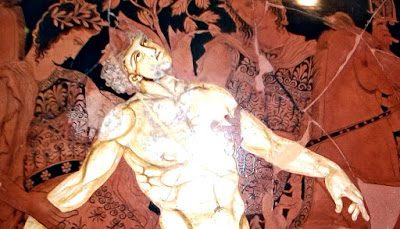 |
| Photo: Adrienne Mayor |
 |
| A Greek vase painting, dating to about 450 BCE, depicts the death of Talos, an early conception of a robot from Greek myth. Photo: Forzaruvo94/Wikimedia Commons |
“Our ability to imagine artificial intelligence goes back to the ancient times,” says Mayor, who is also a fellow at the Center for Advanced Study in the Behavioral Sciences. “Long before technological advances made self-moving devices possible, ideas about creating artificial life and robots were explored in ancient myths.”
Mayor, a historian of science, says that the earliest themes of artificial intelligence, robots, and self-moving objects appear in the work of ancient Greek poets Hesiod and Homer, who were alive sometime between 750 and 650 BCE.
The story of Talos, which Hesiod first mentioned around 700 BCE, offers one of the earliest conceptions of a robot, Mayor says.
The myth describes Talos as a giant bronze man that Hephaestus, the Greek god of invention and blacksmithing, built. Zeus, the king of Greek gods, commissioned Talos to protect the island of Crete from invaders. He marched around the island three times every day and hurled boulders at approaching enemy ships...
In addition to creating Talos and Pandora, mythical Hephaestus made other self-moving objects, including a set of automated servants, who looked like women but were made of gold, Mayor says. According to Homer’s recounting of the myth, Hephaestus gave these artificial women the gods’ knowledge. Mayor argues that they could be considered an ancient mythical version of artificial intelligence.
Read more...
Source: Futurity: Research News












